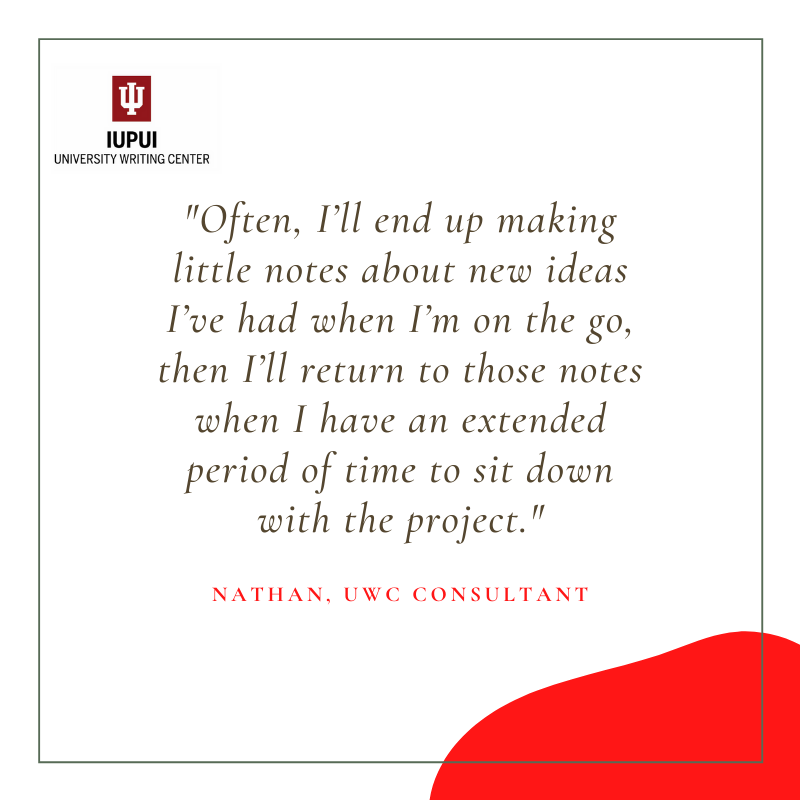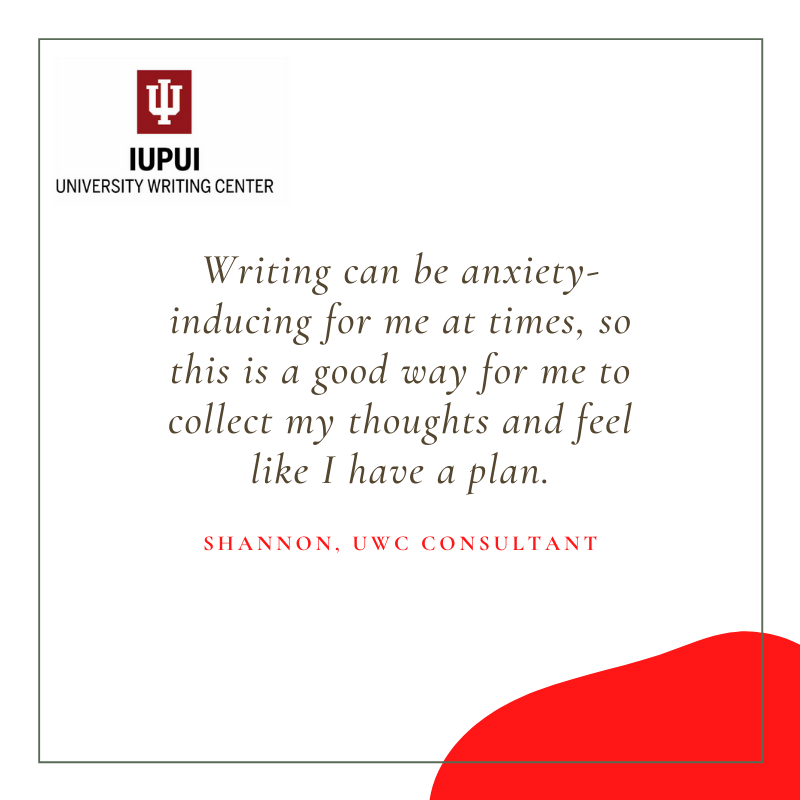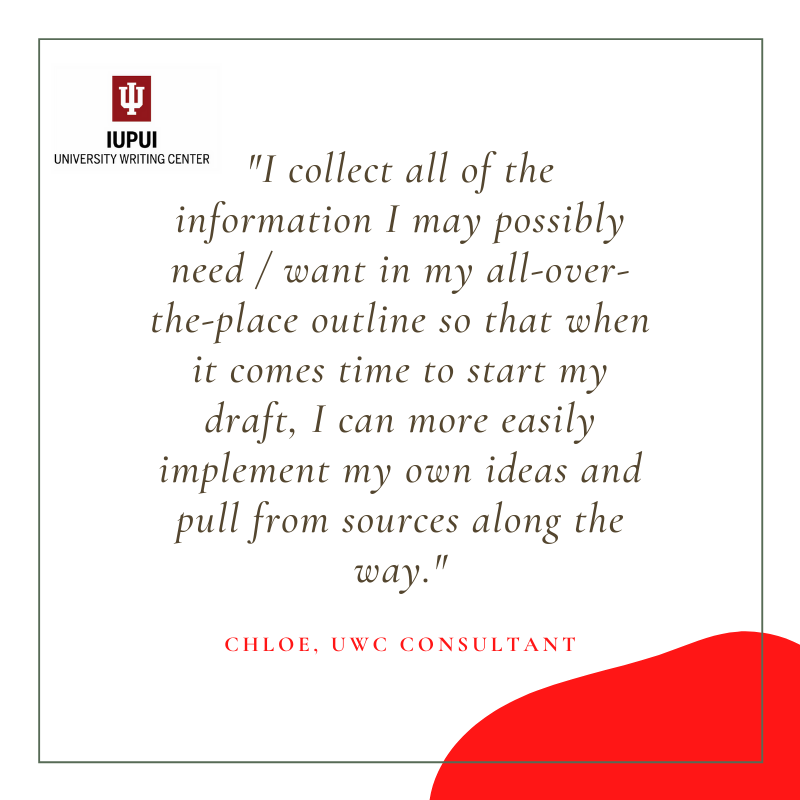Responses Compiled By: Lauren W.
Contributors: Nathan, Shannon, and Chloe.
This week, I asked fellow consultants to share their writing process and how they go about beginning different writing projects. Below consultants Nathan, Shannon, and Chloe will detail how they go about writing, and hopefully provide you with some tips and tricks to try when beginning your next writing project.

Nathan: “My writing process varies depending on what I’m writing. With research writing, I like to make sure that I start the research process really early so that I have time to find the best resources and think about my project even when I’m not actively sitting down with it. Often, I’ll end up making little notes about new ideas I’ve had when I’m on the go, then I’ll return to those notes when I have an extended period of time to sit down with the project. The Notes app on my phone is a lifesaver! With creative pieces, I tend to write in bursts; three to four hour blocks of time when I can sit uninterrupted are ideal. Of course, I will also make notes if I have a spark of inspiration when I don’t have time to sit down and write, but in general, I tend to churn out a full draft in one sitting with creative nonfiction pieces, poems, etc. If I’m writing something that requires me to read and synthesize multiple sources, it takes longer for me to get out a full first draft. No matter what genre I’m writing, however, I like to make sure that I can sit down with my piece 2-3 times after I’ve gotten the first draft done—more than that if it’s a particularly lengthy piece. Even the most solid first draft benefits immensely from being revisited with fresh eyes!”

Shannon: “I begin the writing process by freewriting on the topic in Word without worry of correctness or clarity. This helps me simply getting all my initial thoughts down in writing which helps ease my mind about starting the actual paper itself. Then, I organize my free-writing thoughts into an outline to help guide me while I start writing my initial draft. Writing can be anxiety-inducing for me at times, so this is a good way for me to collect my thoughts and feel like I have a plan.
If I know I have a piece due on a specific day, I try to schedule time where I work on the writing for about 1-2 hours a day to help avoid writer’s burnout. If I am feeling particularly overwhelmed with my writing, I have found that sometimes all it takes is stepping away from it to do something else (like taking a walk, listening to music, or talking with a friend) to help center myself. After my paper is complete, I will save it in another file and begin the editing and polishing stage. I will either read it aloud to myself or read it to a friend to help me pick out the typos, awkward sentences, and unclear points. Then, I will work through the draft little by little until it is complete.”

Chloe: “From a very young age, I loved to make lists. I loved getting out a piece of paper and a pen, scribbling down notes in chronological or alphabetical order. At seven years old, I remember carrying around a clipboard, scribbling down a daily to-do list. I wanted to document basically every moment of my regular routine:
7:30am – Wake up ❒
7:35am – Get dressed ❒
7:40am – Brush teeth and hair ❒
7:45am – Eat breakfast ❒
8:10am – Start homework ❒
Etc., etc….
This constant scheduling has seeped its way into my writing process — the list has become the outline.
I often begin an outline with writing down the assignment guidelines / prompt into a secure document, such as a Google Doc or a page on OneNote. Then I (re)read through any course materials relevant to the assignment, searching for places in the margins where I had drawn stars or written notes. I add these quotes to the document and make sure that I place a simple in-text citation after each one. This ensures that I don’t forget where I got each passage from. I also use the “→” symbol after many of the quotes, followed by my own thoughts about how the quote makes me feel or how it applies to the assignment. The end result is an organized mess, looking something like this:
I collect all of the information I may possibly need / want in my all-over-the-place outline so that when it comes time to start my draft, I can more easily implement my own ideas and pull from sources along the way. Given all of the effort I put into the rough draft, I am usually not too far from a final draft. I have often found that, in this final stage in my writing process, I have been with my piece for an extensive amount of time and it’s difficult to revise it on my own. I need to distance myself from it in order to see / read it more clearly. To do so, I ask a friend or writing consultant to assist me with revisions, as they provide another set of eyes — ones which haven’t been staring at the assignment for the past several hours (or days).
As you have probably noticed, my writing process takes time. I must start earlier enough to give myself an adequate amount of time to process, outline, draft, and revise. I can rarely go into a document and just start typing. This is the writing process that works best for me, but it might not be the best for you. And that’s okay — I just hope that you have found something helpful or insightful in this process!”
Check back for more in the Writing Process series, coming soon!

